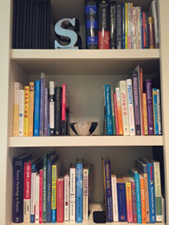The Mindful Living Network states that Monday, January 25th is the most depressing day of the year. While I’m not sure whether or not there is actual research to back up that statement, it is pretty clear that the month of January can be a depressing time. Let’s consider what makes this a difficult month for many people. The build-up and excitement of the holiday season is over, but credit card debt is not over. In many places in North America, the weather is at its absolute worse. Days are shorter and daylight is scarce. Psychologically, your fresh resolutions for the New Year might have taken a bit of a nosedive.
First, it’s important to rule out the difference between winter blues and more serious depression. If you find you are feeling sad much of the time, have nothing you are looking forward, find yourself waking up in the early morning and are unable to go back to sleep, you may be suffering from depression. From time to time, everyone gets depressed. But if the symptoms I mentioned above in addition to changes in appetite, loss of interest in everyday activities, or thoughts of harming yourself are present, you might consider seeking help from a qualified mental health practitioner.
Whether you are depressed or just having a case of the winter blues, there are a number of things you can do to help yourself feel better. Exercise is a natural anti-depressant. So if you are able and weather permits, get outdoors and walk. Attend a group dance or exercise class. Meditate. Get some colored pencils and an adult coloring book. Of course, journaling will provide you with many options, as well.
“Three Good Things,” an exercise taken from positive psychology and developed by Martin Seligman, suggests you write down three good things that happened to you every day. Not only does the memory of three good things lift your spirits, but thinking about or anticipating three good things re-frames how you look at your world each day. You are actually in the practice of finding good things.
An exercise I have found helpful for myself and for clients is called an “I Don’t Want List.” I discovered this exercise for myself many years ago. I found I was really grouchy and didn’t feel like doing anything I was supposed to do. So I started writing down each of those “should.” Somehow, just stating what I didn’t want to do, turned around my negative feelings. Try it; it might surprise you.
You might also try “Giving Depression a Voice.” Sit quietly and close your eyes for a few minutes. Become aware of your breathing. When you are ready, imagine your depression has a voice. Listen to the voice of your depression and write down what you hear.
Remember, spring always follows winter. Get some planting bulbs and plant them in a pot. Before you know it the dark days of winter will be over and your flowers will be in bloom!
If you are feeling stuck with a writing project and need some help let’s set up a time to chat. You can reach me at
susan@susanborkin.com or by phone at (408) 973-7877.
If you are new to blogging, here are some instructions. If you are the first leave a comment, it will say '0 Comments' - just click that link. If you do not have one of the listed accounts, please choose either Name/URL or Anonymous from the profile list before you click 'Post Comment'
Copyright © 2016 Susan Borkin

![]()









